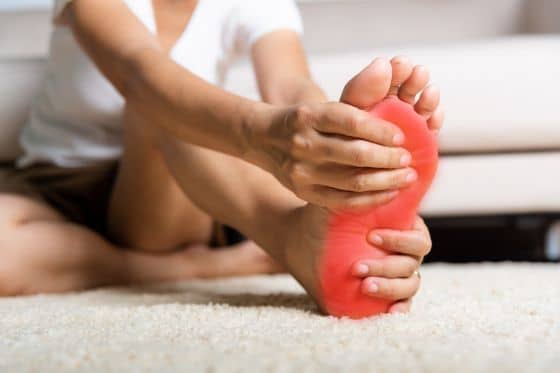If you’ve ever felt a strange tingling in your toes, a burning sensation in your fingertips, or a sense of numbness that won’t go away, you’re not alone. These could be early signs of neuropathy in feet and hands—a condition that affects millions of people and often starts subtly before becoming more disruptive.
As a physical therapist, I often meet people who didn’t realize that their discomfort was related to nerve function until the symptoms became hard to ignore. The good news? Identifying the early signs of neuropathy in feet and hands is the first step toward taking control and exploring strategies that can support comfort and movement.
What is Neuropathy?
Neuropathy, or peripheral neuropathy, is a condition where the peripheral nerves—those outside the brain and spinal cord—are damaged or disrupted. These nerves help you feel sensations and control muscles, so when they aren’t functioning properly, it can lead to a wide range of sensations, from discomfort to difficulty performing daily tasks.
Neuropathy can be caused by a variety of factors, including diabetes, repetitive stress, certain medications, infections, and even poor circulation. But no matter the cause, catching the condition early makes a big difference.
Recognizing the Early Signs of Neuropathy in Feet and Hands
Understanding the early signs of neuropathy in feet and hands can help you recognize when it’s time to take action. Some of the most common early signs include:
- Tingling or “pins and needles” sensations
- Burning feelings that come and go
- Numbness, especially in the toes or fingertips
- Heightened sensitivity to touch
- Weakness or loss of coordination
- A feeling like you’re wearing socks or gloves when you’re not
These symptoms may begin gradually and often affect both sides of the body. You might notice that your hands or feet fall asleep more often, or that simple tasks like buttoning a shirt or walking barefoot feel a bit off.
Why Early Detection Matters
Because the early signs of neuropathy in feet and hands can be easy to dismiss, many people wait until symptoms interfere with their lifestyle to seek help. But the earlier you acknowledge the changes, the more options you have to address them effectively.
Early detection gives you time to explore supportive strategies such as therapeutic movement, gentle exercise, improved nutrition, and wellness guidance that promotes nerve health.
What Causes These Symptoms?
Peripheral nerves are delicate and susceptible to irritation. Several common triggers can contribute to the development of neuropathy:
- Blood sugar imbalances
- Chronic inflammation
- Repetitive motions or overuse
- Vitamin deficiencies
- Injury or trauma
When nerves are damaged or under stress, they can send faulty signals to the brain, resulting in the sensations we associate with neuropathy.
What Can You Do Next?
If you’re starting to notice early signs of neuropathy in feet and hands, the first thing to remember is: you’re not alone, and there are proactive steps you can take.
Here are a few suggestions:
1. Start with Awareness
Track your symptoms. When do they show up? Is it worse in the morning or after certain activities? Keeping a symptom journal can be a helpful tool to guide your next steps.
2. Stay Active
Gentle movement and mobility exercises can support circulation and coordination. Activities like walking, stretching, or guided physical therapy sessions can help encourage comfort and body awareness.
3. Support Your Nerve Health
Nutritional changes, hydration, and adequate sleep all play a role in how your body functions. Some people explore B vitamin supplements or anti-inflammatory foods under the guidance of a healthcare professional.
4. Seek Professional Insight
Don’t wait for things to get worse. A physical therapist trained in nerve-related challenges can help evaluate your movement patterns, discuss what you’re feeling, and guide you with education and appropriate techniques that align with your needs.
5. Avoid the “Wait and See” Approach
Many people think these sensations will “go away on their own.” But symptoms that persist or gradually worsen are worth checking out. Early support makes a difference.
Final Thoughts
Early signs of neuropathy in feet and hands don’t have to stop you from doing the things you enjoy. Whether you’ve just started noticing small changes or you’ve been living with nerve-related discomfort for a while, there are strategies to support your wellness journey.
If you’re ready to take the first step, we’d love to meet you. Call
(609) 845-3585 or click here to book your FREE Discovery Visit today and let’s talk about how to move forward—together.
More free resources:
Read our blog – Stop Living with Burning and Tingling: How to Relieve Neuropathy Symptoms Naturally – South Jersey Physical Therapy and Sports Medicine
Read our blog – Diabetic Neuropathy: The Path Forward Beyond a Past of Pain Towards a Better Future – South Jersey Physical Therapy and Sports Medicine


